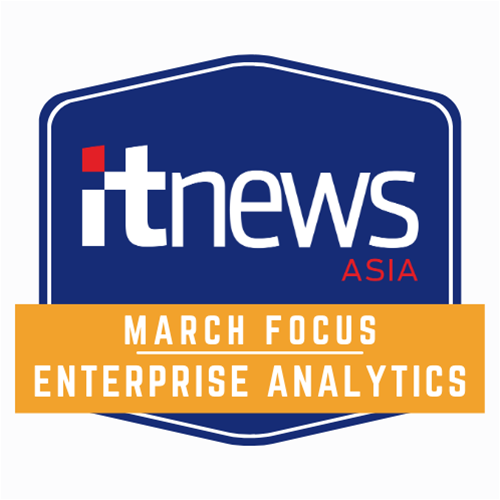
In our data analytics focus this month, iTNews Asia talks to Achim Granzen, Forrester’s Singapore-based principal analyst, on the state of the data analytics landscape in APAC and explores how AI is enhancing analytics with new capabilities.
Achim’s research in the past months focuses on analytics and data-driven transformation; the interplay of technology capabilities and business capabilities; and organisational change and governance.
iTNews Asia: How does Forrester see the data analytics landscape in APAC for 2021? What has been the impact from the pandemic? What's driving growth now?
From our 2021 Business Technographics survey we find that COVID-19 has increased the importance of data and analytics related initiatives. For example, 41% of decision makers with a priority on leveraging data insights in business decision making state this initiative has increased in importance.
We also find that improving the use of data and analytics technology is the top priority for IT organisations in APAC over the next 12 months. Indeed, data and analytics improvements are seen as a high or critical priority for 39% of IT organisations. This indicates that organisations in APAC are now focusing again on technology initiatives that drive business growth, customer experience and product and services innovation.
iTNews Asia: Globally I get a sense that while IT budgets are cut, the use of analytics has remained strong in 2020 as companies see data as essential in building trust and ensure business resiliency. Does Forrester have the same observation in APAC?
Business resilience has replaced traditional disaster recovery: events such as COVID-19 are not a singular interruption from which we simply need to roll back. Business resilience requires agility and innovation on the technology and on the business side, and analytics and AI are key technologies.
In our surveys conducted in late 2020 we found for example that firms in South East Asia growth markets had aligned their business priorities around adaptiveness, customer experience and growth. We can therefore expect that investments in technologies that drive these business goals will remain strong, if not increase, in APAC.
I see building trust with customers, prospects and partners as a major competitive differentiator. But technologies such as AI do come with a risk – what if the AI-infused decision was made on biased data, or you could not explain a rejection decision?
All organisations must focus on ethical, responsible use of data and AI – it must be transparent, fair and accountable. Else, they will risk brand damage and see customer trust erode.
iTNews Asia: Do you see 2021 as the year companies will move data and analytics to the cloud, either directly or in hybrid form (cloud and on-premise)
Nearly all companies are now employing a hybrid strategy – more accurately multi-hybrid, as we see multiple public clouds being used alongside hosted private clouds and on-premises infrastructure or internal private cloud.
While there are regional differences in APAC as well as differences between industries, our research shows that public cloud is set to be the primary cloud platform for organisations going forward. But it won’t be the only one – except for the digital natives.
For example, in Japan and Indonesia we see a clear preference for public cloud as the primary cloud platform across all workloads and applications. In Malaysia, we see public cloud head to head with hosted private cloud as the primary cloud platform. However, the recent announcement by the Malaysian Government to grant conditional approval to four hyperscalers to build operations in the country might change that going forward.
iTNews Asia: Do you also see AI and Machine Learning becoming a sub-specialty within the broader data analytics landscape? How fast is this space growing?
The definition of AI fluctuates a lot, and it is frequently used as an umbrella term for covering everything from statistics to automation to deep learning. Forrester prefers a narrower definition that centres on mimicking how humans sense, think and act.
There are no clear-cut boundaries though. In our recent research we found that AI is now poised for prime time. For example, AI consultancies and service providers in APAC are delivering more production deployments than any other type of deployment.
In 2020, production deployments accounted for 45% of all engagements. 2 years ago we saw that number to be 20%. As a consequence I also see a change in how AI is engaged.
Algorithms are becoming more and more specialised and are applied closer to the business process – for example in claims processing in insurance. AI-infused processes, algorithms deployed as-a-Service will likely replace general purpose AI platforms for production deployment at scale.
iTNews Asia: What challenges do organisations face and how difficult is it for them to become more data-driven? Do you agree that the three foremost challenges most companies face are (a) getting access to data (b) data and privacy and (c) lack of talent?
Agreed. Organisations continue to struggle with identifying and curating data for their insights demands – and the talent crunch has only intensified.
To counter the first challenge, organisations must invest in data strategies but also in data literacy programs. To counter the second challenge, organisations must invest in building talent inhouse and change their hiring approach. Offering a paid training program for new hires for example – I would like to see more of this.
However the challenge that I see accelerate most is around data and privacy – or ethical use of data and tech. In particular when it comes to deploying AI at scale – for AI-enabled decision making and AI-infused process acceleration – organisations must invest into data and technology governance.
Around 5 years ago, privacy laws around the world (such as GDPR in the EU) added a new dimension to data and tech governance, which was around privacy and personal data protection.
With AI now ready for prime time, I see another dimension must be added – this time around ethics and accountability. Ultimately, organisations must prepare now to engage in a risk management approach when it comes to deploying responsible AI at scale.










